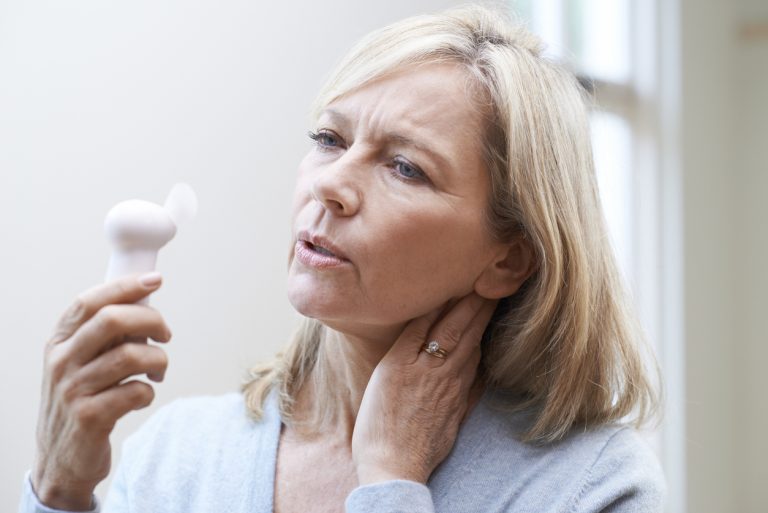Why Women Get Hot Flushes At Menopause
If you’re experiencing hot flushes it can help to know why, then you can find the most effective way to tackle them.

It seems that hot flushes are the bane of many women’s lives during menopause – and they can have quite an effect on those around them too.
Hot flushes can come on without any warning and range from being mildly uncomfortable to downright unbearable.
Symptoms range from just a slight redness of the face to a full body sweat that leaves you wringing wet and generating enough heat to boil water. Then there are the dreaded night sweats which can seriously disturb your sleep.
It’s estimated that around 30% of menopausal women will get some form of hot flushes. How affected you are will depend on several factors, including where you live and what you eat.
Some lucky women never get them at all and they are certainly very much more common in the Western world. For example, there is no word in Japanese to cover this phenomenon because Japanese women do not seem to suffer from it – unless they have switched to a predominantly Western diet.
If you are unlucky enough to suffer from hot flushes I hope this article will help you learn why they occur. If you’re not yet a sufferer, then it will help you gauge whether or not you are likely to become one.
Although some lucky women escape completely, there are some very good reasons why we experience the heat that we associate with menopause:
1. Blood vessels
Hot flushes occur when the blood vessels below the skin dilate. This causes more blood to rush to the skin’s surface, and that is what makes you look red and flushed, and feel that tell-tale rise in temperature.
The body’s normal response to this is to try and cool you down, and it does this by making you sweat. What is unique about hot flushes is that this mechanism kicks in when the outside temperature may be low and you do not have any signs of fever.
2. Fluctuating hormones
Well you know all about this during menopause, and in fact it’s the changing levels of your hormones are the prime cause of hot flushes, more than the actual hormones themselves.
When your hormone levels fluctuate they cause the temperature control mechanism in the body to be disturbed. The centre which controls this is in a part of the brain called the hypothalamus and it seems that it’s changing levels of oestrogen and FSH (follicular stimulating hormone) that can upset this delicate balance and cause hot flushes.
Women having hot flushes usually have decreased oestrogen levels and increased FSH levels, and usually low progesterone too.
However it’s important to remember that it’s the changes and fluctuations in the hormone levels – rather than the actual amount of hormone being produced – that produces hot flushes.
3. Surgical menopause
It’s to be expected that menopause symptoms occur naturally when a woman’s childbearing years are coming to a close and the menopause or perimenopause is under way.
However, women who have a hysterectomy – or their ovaries removed at an age when they would not normally be going through menopause – are more likely to experience more severe and frequent hot flushes after the surgery than in a natural menopause transition.
Even if the ovaries are retained it’s no guarantee that an early menopause will not occur, as their effectiveness at producing progesterone will be affected and will diminish over time.
Helpful information:
These are some of the reasons behind hot flushes. I hope it helps explain why you may be feeling hot and bothered. After all, knowledge is power, and some women do like to refer to their hot flushes as power surges!
Bioidentical hormone creams can be one of the most effective treatments for the relief of hot flushes, as well as other menopausal symptoms.
Depending on your specific symptoms you may need help from a progesterone only cream like Wellsprings Serenity and more severe symptoms may need a little extra oestrogen from Wellsprings combination cream 20 to one.
Not sure which hormone, or hormones, you may need to supplement? You’ll find this article can help.
https://anna.blog.wellsprings-health.com/which-hormone-or-hormones-might-you-need/


















